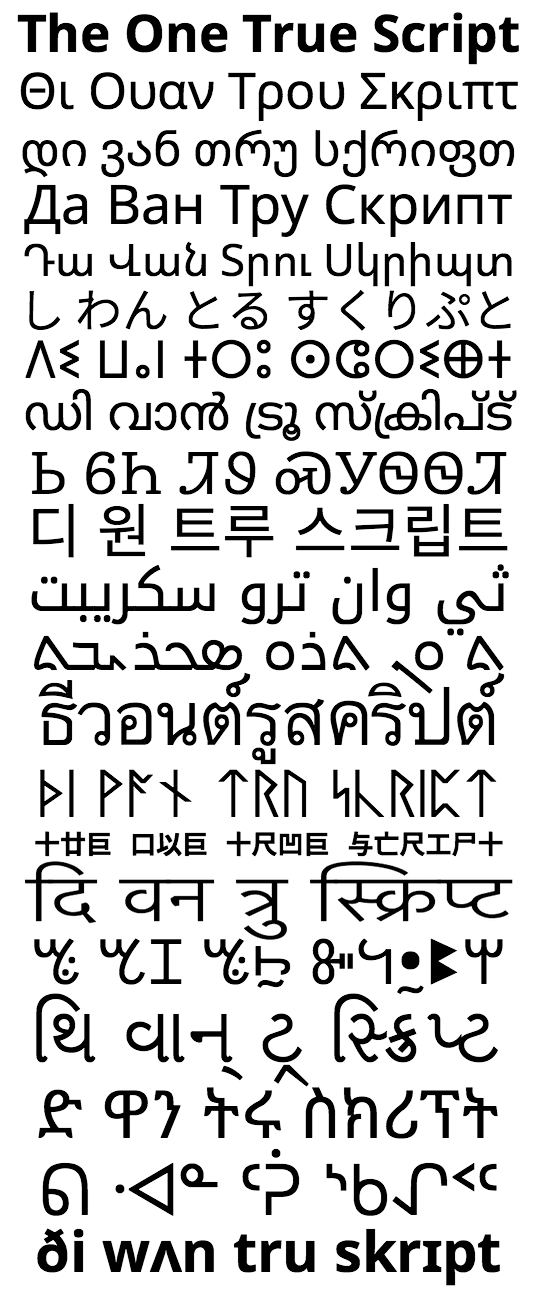The One True Script
A Letter From the Editorially Bored
We at SpecGram would like to wish you a Happy New Year in 2018! We would like to, but we can’t—largely due to the immense stupidity we encounter daily. For much of 2017 we have been fretting over the fact that Kazakhstan has announced plans to drop the Cyrillic alphabet in favor of the Latin alphabet. All the cool languages in the region have done it—Azerbaijani, Uzbek, Turkmen—and as a result there are elderly speakers of each language who have transitioned from Arabic to Latin to Cyrillic and back to Latin over the last 90 years or so. It’s easy to imagine, after the second or third switch in one’s lifetime, coming to the conclusion that literacy is overrated.
The problem is not that these languages/countries/speakers have changed their orthography in response to political, cultural, and technological needs and desires—indeed they have shown bravery and determination in undertaking such a difficult transition. No, the problem is that they keep switching to the wrong orthography.

Admittedly, the choice was less clear in the early 20th Century when the Arabic-to-Latin switch was made, and the subsequent Soviet-imposed Latin-to-Cyrillic switch wasn’t much of a choice. While the Latin alphabet has many cultural, communicative, and technological points in its favor, its implementation across world languages is still a diacritical hot mess.
But today—in the Unicode-enabled orthographic technotopia in which we find ourselves—the choice is obvious: the IPA is the right orthography for any language—Kazakh, Azerbaijani, Uzbek, or Turkmen and English, Chinese, Hindi, Spanish, Arabic, Malay, or Russian!
Modern technology has made the prospect of switching to the IPA as a daily-use orthography much more tenable. We’re only a few software updates away from having IPA characters widely available on typical current keyboards—either as actual keyboard layouts for the diligent touch typists, or as extensions to the now ubiquitous press-and-hold character selection menu. We even have a ready-made basis for an IPAish texting orthography in the form of X-SAMPA.
At this point anyone who has taken—or worse, taught—an introductory phonetics course will vociferously object that there is no One True Pronunciation to encode in a new orthography—a fact that has hampered many an attempt at spelling reform. English, for example, is already a pluricentric language, with lexical, syntactic, and orthographic differences among several standard varieties. There’s no reason that the orthographic pluricentricity shouldn’t continue, but instead of pointless o/ou and -er/-re variation—the result of Noah Webster sticking his thumb in the Brits’ lexigraphic eye—the variants would be meaningful and useful.
A famed linguist’s famed protestations against hegemony notwithstanding, the obvious candidate for a given standard IPA spelling would be the local national or sub-national standard dialect—polished a bit by linguists with an eye toward appropriately abstract phonological rather than overly detailed phonetic transcriptions. It would also make sense to preserve major distinctions that are made in major dialects—for example American English kɒt/kɔt and pɪn/pɛn—despite any potential protestations of Californians or Texans over maintaining these distinctions.
Any sufficiently large dialect group could spawn their own recognized spelling variant, and learning a new dialect would be as easy as obtaining a local paper. Smaller communities, online for example, could differentiate themselves and their spelling even further. And all without resorting to hideous and inherently stigmatizing eye dialects.
Learning the pronunciation of a new language would also be simplified, with all orthographies becoming reasonably shallow. Pronunciation of foreign names would improve and borrowing pronunciations would become more systematic, as near universal substitutions—e.g., k for x when borrowed into English—would quickly become well established.
Now, if we could only do something about the name for German/Deutsch/alemán/niemiecki/tedesco/saksa/vokiečių across languages. That would make the outlook for 2018 much brighter, indeed.


